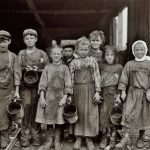The time of George 11, the court rolls become far more interesting and importantly in many cases recognizable to their location.
This record for the first time mentions Josiah Spode, the potter who was purchasing copyhold land in the centre of Stoke town with full descriptions of buildings and layout etc.
This applies to many other entries in this ten-page document and is a value for those who not only wish to trace the origins of the pottery industry, the development of the town of Stoke but also follow the lines in families.
This is certainly a worthy document which brings study right up the mid-8th century.
por 20 – The poor conditions for vagrants
£2.00Under the Poor Law of 1834 there were no benefits it was simply if you had no money, no home, no job you would apply to be admitted into a workhouse. The objective was to enforce the worst conditions they could in the hope that those desperate would do anything to remain out of the workhouse. Here families were separated by gender and a minimum age necessary for the maintenance of ‘decency’ whereby children were segregated from adults in order to dissuade them from a life of indolence and mendicancy and kept from what was considered ‘sluggish sensual indolence’.
Vagrants or casuals were travellers from town to town, perhaps we could call tramps. The 1834 Act was designed to stem the drain of resources as a deterrent, but vagrants dominated the flow of poor inmates. In 1837 workhouses became obliged to provide temporary overnight shelter for any destitute person, forcing guardians to arrange special accommodation for this category. Initially, vagrants were housed in infectious wards, stables and outhouses anywhere until purpose built vagrant wards were built at the edge of the main workhouse site, frequently having its own access from the highway to avoid contamination with other inmates.
Vagrants would arrive late in the afternoon waiting for admission and their personal belongings removed. The number of beds available for vagrants was frequently limited and late-comers found themselves turned away. In better-regulated wards, they were stripped, bathed and their clothes disinfected, and a bread and water supper were served.
This was the way in which people were treated if they became a burden upon the parish and in turn taxed the local residents based upon the value of their home. Many think the of survival today with increasing costs everywhere, but in reality, nearly two hundred years ago life then was beyond imagination. Read more about times then for those who had nothing except the clothes they stood up in. Yes, the poor law did make some difference to those who came knocking but inside you were treated less than human.










Reviews
There are no reviews yet.